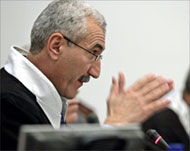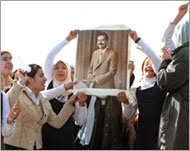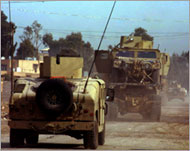Saddam trial adjourned
Saddam Hussein has lashed out over his treatment by US guards and demanded that the chief judge stand up to what he called American occupiers and invaders as his trial for crimes against humanity resumed in a heavily guarded Baghdad court.

The 68-year-old former president began his monologue on Monday with a verse from the Quran which reminds believers who aspire to heaven that God knows who participated in the struggle and who persevered.
Two of the seven other defendants also spoke out during the two-and-a-half-hour session, complaining of their treatment in detention or dissatisfaction with their court-appointed counsel.
The tribunal adjourned until next Monday to give the defence time to replace lawyers slain since the opening session on 19 October.
The court’s tolerance of such comments drew sharp complaints from some politicians, who believed the Iraqi High Tribunal was bending over backwards to accommodate a defendant who should have already been convicted and executed.
“The chief judge should be changed and replaced by someone who is strict and courageous,“ said one legislator, Ali al-Adib, a senior official in Prime Minister Ibrahim al-Jaafari’s party.
Saddam and his co-defendants stand accused of killing more than 140 Shia Muslims after an assassination attempt against the former president in the town of Dujail in 1982.
Possible death penalty
Convictions could bring a sentence of death by hanging.
The tribunal allowed former US attorney-general Ramsey Clark and prominent lawyers from Qatar and Jordan to join the defence team as advisers, a move aimed at convincing foreign human-rights groups that the trial would meet international standards of fairness.
 |
|
The deposed president could face |
Also, the chief judge, Rizgar Muhammad Amin, ordered all handcuffs and shackles removed from the defendants before they entered the courtroom – another gesture towards the accused.
Saddam, well-groomed and the only defendant wearing Western clothes, moved quickly to try to seize control of the proceedings.
He was the last defendant to enter the chamber. While other defendants appeared frightened and exhausted, he swaggered confidently to his seat, greeting people along the way with the Muslim greeting “peace be upon you“ as he held a copy of the Quran.
He complained that he had to walk up four flights of stairs in shackles and accompanied by “foreign guards“ because the elevator was not working.
Judge Amin said he would tell the police not to let that happen again.
Saddam’s response
“You are the chief judge,“ Saddam snapped back. “You should be giving them instructions and not just tell them. This is our country.
“You are Iraqi and they are foreigners and occupiers. They are invaders.“
Saddam also furiously complained that some of his notes and his pen had been taken from him.
 |
|
Judge Amin had handcuffs and |
“How can a defendant defend himself if his pen was taken? Saddam Hussein’s pen and papers were taken. I don’t mean a white paper. There are papers downstairs that include my remarks in which I express my opinion,“ he said.
Amin ordered bailiffs to give Saddam pen and paper.
None of the nearly 35 prosecution witnesses testified on Monday, but the prosecution entered into evidence two videotapes – one shot in the aftermath of the assassination attempt showing Saddam in military uniform interrogating three villagers.
The second was a videotaped statement by former intelligence officer Wadah Ismail al-Shaikh made last month shortly before he died of cancer.
Amin read the transcript as the tape played without sound.
Dujail arrests
According to the transcript, al-Shaikh, who appeared frail and sat in a wheelchair in a US-controlled hospital, said about 400 people were detained after the assassination attempt, although he estimated only between seven and 12 armed men actively participated in the ambush of Saddam’s convoy.
“I don’t know why so many people were arrested,“ al-Shaikh said, adding that Ibrahim, head of intelligence at the time, “was the one directly giving the orders“.
 |
|
Women in Tikrit raise slogans in |
A day after the assassination attempt, whole families were rounded up and taken to Abu Ghraib prison, he said.
At the end of the session, Saddam’s half brother and fellow defendant, Barazan Ibrahim, complained he had not received proper medical treatment since being diagnosed with cancer and that this amounted to “indirect murder“.
Defendant Awad al-Bandar said he and Saddam had been threatened in court last month. The judge told him to submit his complaints in writing.
Judge Amin then adjourned the hearing until Monday. Saddam’s personal attorney, Khalil al-Dulaimi, complained the defence needed at least a month.
Amin suspended the hearing for 10 minutes to confer with the four other judges and then announced that the Monday date would remain.
Fever pitch
Clark and others argue that a fair trial is impossible in Iraq because the country is under foreign military occupation.
On Monday, Clark told CNN it was “extremely difficult“ to assure fairness in the trial “because the passions in the country are at a fever pitch“.
 |
|
In court Saddam referred to US |
“How can you ask a witness to come in when there’s a death threat?“ he asked. “Unless there’s protection for the defence, I don’t know how the trial can go forward.“
Clark, who was attorney-general under president Lyndon Johnson, is a staunch anti-war advocate who met Saddam days before the 2003 US-led invasion.
He has also consulted several times with one-time Yugoslav president Slobodan Milosevic, who is on trial in The Hague, Netherlands, on war crimes charges.
The Qatari lawyer and former justice minister Najib al-Nuaimi, who has also joined the defence team, on Monday contested the legitimacy of the Iraqi court and its right to try his client.
The presiding judge has promised to respond to the contestation raised by al-Nuaimi in due course.
Legitimacy in question
“I will tackle the mandate of this court in exercising the duty it was assigned for. We reserve the right not to hear any witnesses or see any matter until the court resolves the question of its legal mandate, as based on local and international law,” al-Nuaimi said.
“With due respect to its judges, we contest the legitimacy of this court.”
 |
|
Ex-Qatari justice minister Najib |
A member of the united Iraqi coalition, Abbas al-Bayati, told Aljazeera in his reaction to al-Nuaimi’s statement: “Casting doubt on the trial has no legal support since the court is properly structured and has been granted full-scale legitimacy.”
Asked whether he sees the court performance as poor, al-Bayati said: “On the contrary. Iraqi public opinion was critical of this court, saying it was too soft on Saddam and his cohorts to the extent that it broke all convention in the proceedings between judges and defendants.”
Commenting on Saddam’s protest against what he saw as harsh treatment by US guards, he said: “Neither the US nor the Iraqi troops will dare mistreat the defendants.
“Any mistreatment will adversely reflect in public opinion and in the media, which will immediately take advantage of such incidents.”